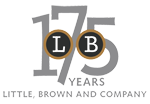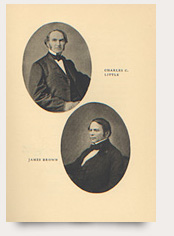|

A Brief History of Little, Brown and Company
“Frankly, I have no use for Messrs. Little and Brown … it’s the ‘and Company’ I’m fond of.”
-- Ogden Nash
Little, Brown and Company is one of the country’s oldest and most distinguished publishing houses. Led by publisher Reagan Arthur, Little, Brown brings out fiction and nonfiction by many of America’s finest writers in hardcover, paperback, ebook, and audio formats. Michael Pietsch is the Chairman and CEO of the Hachette Book Group, of which Little, Brown is a division. Terry Adams, Digital and Paperback Publisher, oversees Little, Brown’s paperback lines, including Back Bay books and Little, Brown trade and mass market paperbacks, as well as Little, Brown’s electronic publishing program. Judy Clain is Little Brown's Editor in Chief and Craig Young is its Deputy Publisher.
 Little Brown and Company was founded in Boston in 1837, when Charles Little and James Brown formed a partnership “for the purpose of Publishing, Importing and Selling Books.” The company was primarily a bookseller at first, as were most publishing firms of that day, and has in fact traced its roots back even further – to 1784 and a bookstore opened on Marlborough Street by Ebenezer Battelle. Mr. Little and Mr. Brown began by publishing the works of Benjamin Franklin and George Washington, and highlights of their early lists include Edward Gibbon’s Decline and Fall of the Roman Empire, The Letters of John Adams, the speeches of Daniel Webster, and Oliver Wendell Holmes Jr.’s landmark The Common Law. In 1859 the company took over publishing rights to a book entitled Familiar Quotations by John Bartlett. The eighteenth edition of the now familiar Bartlett’s Familiar Quotations, with Geoffrey O’Brien as General Editor, arrived in 2012. Little Brown and Company was founded in Boston in 1837, when Charles Little and James Brown formed a partnership “for the purpose of Publishing, Importing and Selling Books.” The company was primarily a bookseller at first, as were most publishing firms of that day, and has in fact traced its roots back even further – to 1784 and a bookstore opened on Marlborough Street by Ebenezer Battelle. Mr. Little and Mr. Brown began by publishing the works of Benjamin Franklin and George Washington, and highlights of their early lists include Edward Gibbon’s Decline and Fall of the Roman Empire, The Letters of John Adams, the speeches of Daniel Webster, and Oliver Wendell Holmes Jr.’s landmark The Common Law. In 1859 the company took over publishing rights to a book entitled Familiar Quotations by John Bartlett. The eighteenth edition of the now familiar Bartlett’s Familiar Quotations, with Geoffrey O’Brien as General Editor, arrived in 2012.
To this day, Little, Brown remains committed to publishing fiction of the highest quality and nonfiction of lasting significance. The company’s bestselling novelists include J.D. Salinger, Herman Wouk, James Patterson, Anita Shreve, Michael Connelly, Alice Sebold, Janet Fitch, Pete Hamill, Emma Donoghue, David Foster Wallace, Kate Atkinson, Stephenie Meyer and Elin Hilderbrand. In its early days, Little, Brown published Little Women and Little Men by Louisa May Alcott, Man Without a Country by Edward Everett Hale, and the poetry of Emily Dickinson. Over the years it has brought out important novels by Norman Mailer, Thomas Pynchon, Gore Vidal, Evelyn Waugh, John Fowles, Thomas Berger, Erich Maria Remarque, James Carroll, Richard Yates, John P. Marquand, Ellery Queen, Ngaio Marsh, C.S. Forester, John Barth, and Rick Moody.
Little, Brown has long been recognized as a publisher of substantial works of history, biography, and current affairs. Memoirs by Nelson Mandela, George Stephanopoulos, Henry Kissinger, Alan Dershowitz, Lillian Hellman, Pete Hamill and Keith Richards have all been newsmakers and bestsellers in recent years. Noteworthy works of history and biography by William Manchester, Dumas Malone, James Thomas Flexner, Arthur Schlesinger Jr., Bruce Catton, Samuel Eliot Morison, I.F. Stone, Frances FitzGerald, Harrison Salisbury, Robert Dallek, Ronald Takaki, James Bradley and Sir Harold Evans are perennial sellers, as are Peter Guralnick’s two-volume biography of Elvis Presley and Gary Giddins’s life of Bing Crosby. Other prominent works of nonfiction, such as Edith Hamilton’s Mythology, Carl Jung’s The Undiscovered Self, Daniel Dennett’s Consciousness Explained, John Feinstein’s A Good Walk Spoiled, Malcolm Gladwell’s The Tipping Point, Stacy Schiff’s Cleopatra, and Jonathan Safran Foer’s Eating Animals have been at the heart of Little, Brown’s program. And over the years the line has been graced by the comic genius of Ogden Nash, James Thurber, Berkeley Breathed, R. Crumb, David Sedaris, The Onion, and Tina Fey.
Little, Brown also publishes books for the practical sides of life: the list includes bestselling nature guides (the Stokes Field Guide to Birds of North America by Donald and Lillian Stokes), childrearing advice (The Baby Book by William and Martha Sears), pet-care perennials (the Monks of New Skete’s The Art of Raising a Puppy), personal reference (Roy Peter Clark’s Writing Tools), health (Dr. Joel Fuhrman’s Eat to Live), and cookbooks (the original Fannie Farmer’s Boston Cooking-School Cook Book, James Beard’s American Cookery, and The Flavor Bible by Karen Page and Andrew Dornenburg).
 Beginning in 1974 when Little, Brown acquired the works of the New York Graphic Society, later renamed Bulfinch Press, illustrated books have been an important part of Little, Brown’s publishing program. The works of Ansel Adams have been a cornerstone of the list, which has also included books by renowned photographers Robert Mapplethorpe, Henri Cartier-Bresson, Irving Penn, Joyce Tenneson, and Herb Ritz as well as critically acclaimed books on the arts, interior design, architecture, and pop culture. Beginning in 1974 when Little, Brown acquired the works of the New York Graphic Society, later renamed Bulfinch Press, illustrated books have been an important part of Little, Brown’s publishing program. The works of Ansel Adams have been a cornerstone of the list, which has also included books by renowned photographers Robert Mapplethorpe, Henri Cartier-Bresson, Irving Penn, Joyce Tenneson, and Herb Ritz as well as critically acclaimed books on the arts, interior design, architecture, and pop culture.
In 1909, Little, Brown moved into the Cabot mansion, a five-story brick town house on Beacon Hill overlooking Boston Common. The company was incorporated in 1913 and in the mid-1920s opened a New York office. In 1926, the company formed a children’s department, now known as Little, Brown and Company Books for Young Readers; it has long been a home for superb children’s books. Little, Brown grew and sprawled beyond the Cabot mansion, occupying three different Boston locations and two suburban warehouses before being combined in a single Government Center location in 1997.
Time Inc. purchased Little, Brown in 1968, beginning a long collaboration between Little, Brown and the Time Inc. magazines, which resulted in such bestsellers as LIFE: Our Century in Pictures, and One Nation, which commemorated the events of September 11, 2001. In 1989, after Time Inc. merged with Warner Communications, Little, Brown and Warner Books (now Grand Central Publishing) joined forces to increase their sales and marketing strength while preserving the editorial autonomy of both companies. Around this time, Little, Brown’s editorial department, long divided between Boston and New York, moved entirely to New York, along with all marketing, publicity, production, and art staff. The Boston office remains home to the Company’s legendary staff of copyeditors and numerous other departments. In 1992, a UK publisher, now known as the Little, Brown Book Group, was acquired, home to the imprints Little, Brown, Virago, Abacus, Orbit and others.
In 1993, Little, Brown created a new trade paperback imprint, Back Bay Books, to focus on long-term publication of the company’s best fiction and nonfiction. Back Bay’s new editions of classics including William Least Heat-Moon’s Blue Highways, Tracy Kidder’s The Soul of a New Machine, Evelyn Waugh’s A Handful of Dust, John Fowles’s novels, and C.S. Forester’s Hornblower series, among many others, have given these books fresh lives. At the same time, Back Bay paperback editions of new works by David Sedaris, Anita Shreve, Emma Donoghue, David Foster Wallace, Stephenie Meyer, James Bradley and Malcolm Gladwell have been impressive bestsellers in their own right.
In 2006, Little, Brown became part of the Hachette Book Group, which was created when Hachette Livre, the world’s second-largest publishing company, acquired the Time Warner Book Group. Hachette Livre is a subsidiary of Lagardère, a French company that is active worldwide in the areas of communications and media. The U.K.’s Little, Brown Book Group became part of the newly formed Hachette UK at the same time.
In 2010, Little, Brown launched Reagan Arthur Books, an imprint with a simple, single focus: excellent writing and superior storytelling. Led by Editorial Director Reagan Arthur, who acquired and edited Elizabeth Kostova’s monumental bestseller The Historian, the imprint’s first lists featured The Unnamed by Joshua Ferris, Bossypants by Tina Fey, The Island by Elin Hilderbrand, Started Early, Took My Dog by Kate Atkinson, and The Complaints by Ian Rankin as well as numerous lauded debut novels. Also in 2010, Little, Brown announced the creation of Mulholland Books, a new imprint for publishing the best suspense fiction of all kinds – thrillers, crime novels, police procedurals, espionage stories, even supernatural suspense and horror. Its debut list in Spring 2011 included Guilt by Association by Marcia Clark and A Drop of the Hard Stuff by Lawrence Block.
In 2009, Little, Brown introduced a new logo that was inspired by antique typewriter keys, honoring Little, Brown’s rich history of publishing great writers since 1837. The company is thriving by every measure: growing, expanding into new areas of publishing, and embracing the extraordinary opportunities presented by ebooks and digital communication with readers. In 2010 it was ranked by Publishers Weekly first among all U.S. publishers in the number of weeks its books spent on hardcover bestseller lists. As the company proudly reaches its one hundred and seventy-fifth anniversary, Little, Brown has just hit its stride. |
|